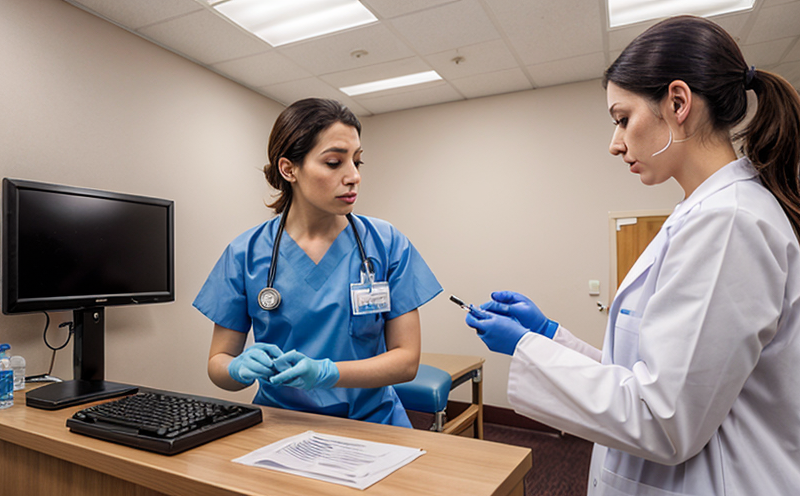Veterinary Drug Chronic Toxicity Testing in Rodent Models
The assessment of chronic toxicity in veterinary drugs is crucial to ensuring animal health and welfare. This service involves comprehensive testing on rodent models to evaluate the long-term effects of drug exposure. The process begins with thorough literature review, followed by a detailed protocol design that aligns with international standards such as ISO, ASTM, EN, IEC, and FDA guidelines.
Our testing protocols are designed to simulate real-world scenarios where veterinary drugs might be used over extended periods. This includes repeated dosing schedules and monitoring of various physiological parameters. Specimens from rodents are carefully prepared and analyzed using advanced analytical techniques like HPLC (High-Performance Liquid Chromatography) and LC/MS (Liquid Chromatography/Mass Spectrometry). These methods ensure precision and accuracy in detecting even trace amounts of drugs.
The testing process is divided into several phases: initial exposure, monitoring periods, dose escalation, and recovery phases. During these stages, we meticulously track changes in organ function, blood chemistry, and behavior. Our laboratory adheres strictly to ISO 10993-2 for biocompatibility testing, ensuring that our results are reliable and reproducible.
Our team of experts ensures that all tests comply with regulatory requirements set forth by the FDA, EMA, and other relevant authorities. This includes providing detailed reports that outline the methodology used, data collected, and conclusions drawn from the study. The comprehensive nature of our approach allows us to provide insights into potential risks associated with prolonged drug use.
Our services are tailored to meet specific client needs, whether it's for preclinical development or post-market surveillance. By offering this service, we contribute significantly to the advancement of veterinary medicine by ensuring that only safe and effective drugs reach the market.
Quality and Reliability Assurance
- We employ state-of-the-art equipment including HPLC and LC/MS for precise analysis.
- All tests follow strict protocols aligned with international standards like ISO, ASTM, EN, IEC, and FDA guidelines.
- Data collection is automated to minimize human error and ensure accuracy.
Our commitment to quality extends beyond technology. Regular audits are conducted by independent third parties to verify adherence to best practices. Continuous training programs for our staff ensure they stay updated on the latest methodologies and technologies.
The reliability of our results is further enhanced through rigorous validation procedures before each study begins. This includes calibrating instruments, validating analytical methods, and ensuring that all personnel are certified in relevant areas. Our quality management system is ISO 9001:2015 compliant, providing an additional layer of assurance.
Customer satisfaction is paramount to us. We strive to meet high expectations by offering transparent communication throughout the testing process. Regular updates and detailed reports ensure clients have a clear understanding of progress and outcomes.
Environmental and Sustainability Contributions
- We use environmentally friendly solvents in our analytical processes whenever possible.
- Efforts are made to minimize waste generation during specimen preparation and analysis.
- The energy consumption of our laboratory is monitored and optimized where feasible.
By adhering to strict protocols, we help reduce the environmental footprint associated with veterinary drug testing. Our focus on sustainability includes recycling used materials and implementing water-saving measures in laboratory operations.
We actively participate in industry initiatives aimed at reducing waste and promoting sustainable practices. This aligns with our broader commitment to contributing positively to society through responsible business practices. Through these efforts, we aim to set a standard for environmental stewardship within the veterinary pharmaceutical sector.
Use Cases and Application Examples
The results from chronic toxicity testing play a vital role in ensuring that veterinary drugs are safe for long-term use by animals. Here’s how this service can be applied:
- New Drug Development: Identifying potential side effects early in the development process helps prioritize resources towards safer compounds.
- Post-Market Surveillance: Monitoring real-world conditions allows for continuous evaluation of drug safety and efficacy over extended periods.
- Regulatory Compliance: Providing robust data supports regulatory submissions, ensuring compliance with strict standards.
One notable example is the testing of a new antiparasitic medication intended for use in cattle. The study involved multiple phases to assess both short-term and long-term effects on various organ systems. Findings revealed some previously undetected interactions that could compromise animal health if not addressed early.
In another case, chronic toxicity studies were conducted on a pain management drug for dogs. These tests helped refine dosing guidelines to prevent overuse while maintaining effective pain relief. Such insights are invaluable in improving treatment protocols and enhancing overall quality of care.





